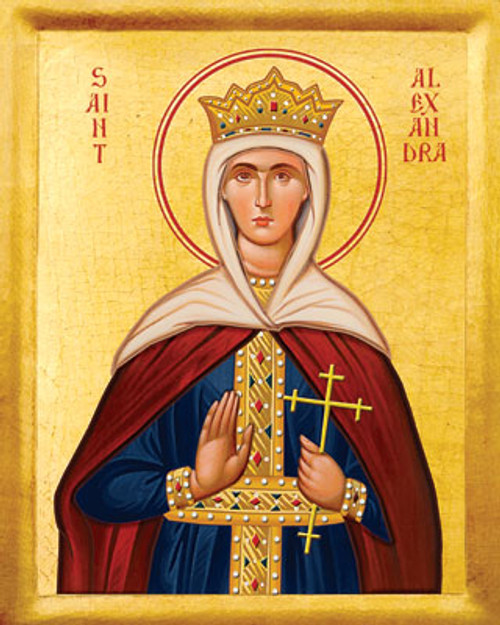Commemorated March 2
Little is known of the early life of Chad, including the date and place of his birth. What is known is based on the writings of St. Bede, which as Bebe noted contained information he received from the monks of Lastingham. Chad was one of four brothers, of whom the others were Cedd, Cynibil, and Caelin. They probably were all from Northumbrian nobility. Chad was born about 634. He was a student of St. Aiden at the Celtic monastery at Lindisfarne, probably during the late fourth and early fifth decades of the seventh century. During the time of the plague, about 650, Chad, accompanied by Egbert, visited Ireland for several years as part of his monastic education. He returned to Northumbria in 664.
In 664, Chad succeeded his brother Cedd, who had founded the monastery at Lastingham, as the abbot of the monastery after Cedd had died of the plague. At the time wide spread deaths among the hierarchs on Great Britain caused by the plague made difficult assembling the requisite three bishops needed for a consecration. Thus, candidates for vacant sees had to travel great distances for their consecration. When the see of Northumbria (York) became vacant following the death of Bishop Tuda of York in 664, Wilfrid, the choice of sub-King of Deira Alcfrith as Tuda's replacement, traveled to Compiegne, in northern France, for his consecration. However, after he failed to return to Northumbria, King Oswui, Alcfrith's father, convinced Chad to become bishop.
Chad was consecrated in Wessex by Bishop Wini of Dorchester and two dubious British bishops. In 666, Wilfrid returned to England and, finding his see occupied, retired to Ripon where he asserted his episcopal rank ordaining priests in Mercia and Kent. In 669, Theodore, having been sent by Pope Vitalian, arrived in England as Archbishop of Canterbury. Having been instructed about the irregularities in the ecclesiastical government of the island, Theodore installed Wilfrid as Bishop of York after having requested Chad to step-down as bishop. Theodore, impressed by Chad's humility during the difficult task, confirmed Chad's consecration as bishop and assigned him as abbot of Lastingham.
Later in 669, King Wulfhere of Mercia converted to Christianity and requested a bishop for his realm. Instead of consecrating a new bishop, Abp. Theodore called Bp. Chad from Lastingham and installed him as the Bishop of Mercia. The territory in Bp. Chad's diocese included Lindsey as well as Mercia. At Lichfield, King Wulfhere provided Chad with land for a monastery at the center of the diocese which ultimately became a settlement.
For the next two and a half years Bp. Chad carried out missionary and pastoral work within the kingdom which covered a large area across England, from coast to coast. Then, on March 2, 672, Bp. Chad died, a victim of the plague, and was buried at the Church of St. Mary of Lichfield. His episcopate in Mercia, the Venerable Bede considered, was decisive in its Christianization.
According to the Venerable Bede, Bp. Chad soon began to be venerated as a saint. Over the following centuries, his relics were moved often, first to the Cathedral Church of St. Peter in 1148 and then to the Lady Chapel of the cathedral in 1296. After Henry VIII dissolved the monasteries and shrines in 1538, his relics became divided and attempts to determine the path of his relics became a tortuous task. Some relics did, in 1841, find their way to enshrinement in the altar of the then new St. Chad's Cathedral in Birmingham, England.
Antoninus exclaimed, "Are you mad? How could a tormented Jew, who was unable to help Himself, possibly help others?"
The Saint replied, "It is not I, but you yourself who are mad. You are spiritually blind, therefore you do not understand the mystery of our salvation, accomplished by Christ the Lord."
Then the ruler ordered that Saint Alexander be tortured. He was beaten, tormented on a wheel, and plunged into a vessel of boiling resin and oil, then he was placed in a fiery furnace. By the grace of God, the Saint was preserved unharmed. When he was thrown into the furnace, the wicked tormentors saw in the flames two young men with handsome faces, praising God along with the Holy Martyr. These were Angels, who cooled the flames of the furnace. The people marveled, for they knew that only one man had entered the furnace, and now there were three.
Antoninus, and those who were with him, regarded all these glorious miracles as magic, because they did not believe in the omnipotent power of Christ God. One of the ruler's servants believed in Christ and fell to the ground before the Saint, begging him to take him along with him to be with Christ. Immediately, the tyrant killed his servant with his sword.
When Saint Alexander emerged from the furnace unscathed, Antoninus ordered that he be hanged, and stabbed with sharp iron needles. The Saint was tortured until his body became one large wound. Those who tortured the Saint marveled at his steadfastness, saying, "How can this man endure such torment? His bones have already been exposed."
Afterward, the Saint was tormented in the fire for a second time, but did not suffer any harm from it. Then his body was stabbed with iron needles and his intestines fell out. Then Saint Alexander was thrown to the wild animals to be devoured, but the beasts did not touch him. This sufferer for Christ endured many other bitter torments, but he remained firm and courageous through all of them. Those who witnessed his suffering were astonished by the power of his patience, which surpassed all human understanding. Finally, the Hieromartyr Alexander was beheaded with a sword.
Just as Antoninus left his judgment seat, he was attacked by the demons he had served. His servants carried him to his home, weeping and sobbing all the way. They did not have time to bring him into the house, however, for he had breathed forth his vile soul.
Saint Alexander was taken to the heavenly abodes to dwell with Christ, His Saints, and His Holy Angels. As for Antoninus, he was cast "into the eternal fire prepared for the devil and his angels" (Matthew 25:41).
After the beheading of Saint Alexander, Eustáthios, an honest man, and a Christian, took the much-suffering body of the Holy Martyr and buried him with honor, glorifyng and praising Christ God.







